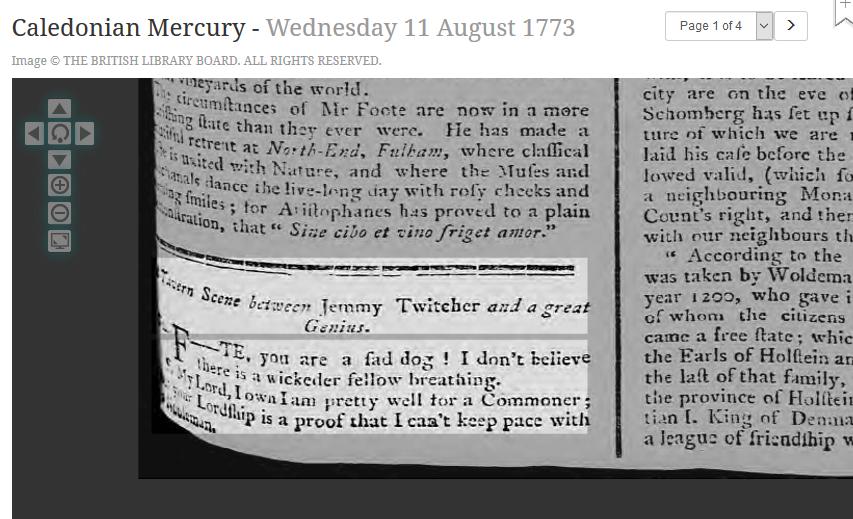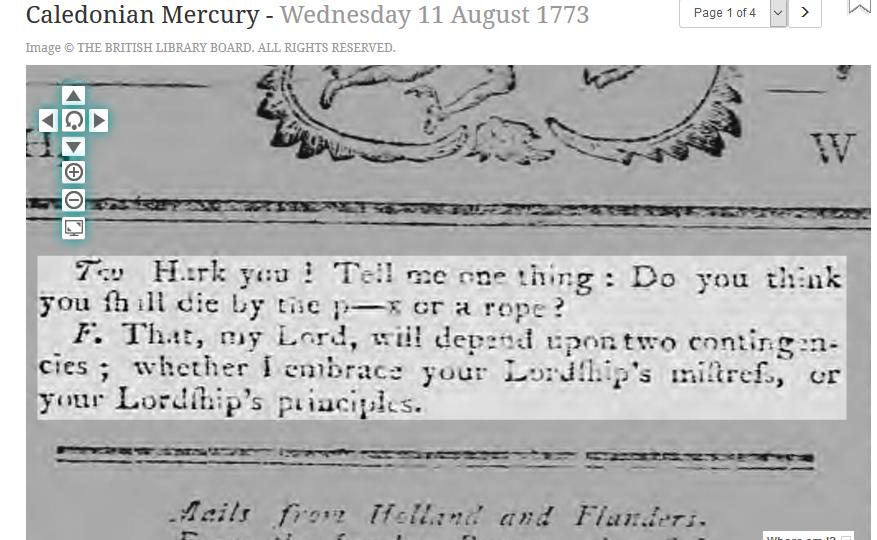Die of the Pox or on the Gallows? April 13, 2018
Author: Beach Combing | in : Modern , trackbackPox or the Gallows
The lines are certainly old ones. A mighty aristocrat offended by some commoner asks whether the man before him will die of the pox or on the gallows tree. The commoner shoots back ‘that depends whether I embrace your Lordship’s mistress or your principles’. No question that it’s memorable. But where does the sentence come from? Was it really fired off in a verbal duel or are these some carefully crafted words to amuse jaded readers?
First, we must acknowledge that much of the research for this question has been done by that outstanding site: Quote Investigator. Our colleagues there have found five sets of combatants: 4th Earl of Sandwich and Samuel Foote; a Nobleman and James Quin; 4th Earl of Sandwich and John Wilkes; William Ewart Gladstone and Benjamin Disraeli; and 4th Earl of Sandwich and Charles James Fox. They have also managed to pull the quote back to 1784 and the European Magazine; a British publication from that year in which Sam Foote and Lord Sandwich cross swords conversationally.
‘Pray Sam,’ retorted his Lordship, ‘which do you think will happen to you first, the experience of a certain disease, or an intimate acquaintance with the gallows?’ ‘Why,’ rejoined the Comedian, ‘that depends upon circumstances, and they are these, whether I prefer embracing your Lordship’s mistress, or, your principles.’
Earlier
We’ve managed to drag it back a little further still. In Aristophanes, being a classic collection of true Attic wit, containing the jests, gibes, bon-mots, witticisms, and most extraordinary anecdotes printed in London in 1778, p. 33 (see head of post).
A tavern-scene between Jemmy Twitcher and a great Genius.
Tw. Foote, you are a sad dog! I don’t believe there is a wickeder fellow breathing.
F. My Lord, I own I am pretty well for a commoner; but your Lordship is a proof that I can’t keep pace with a nobleman.
Tw. Hark you! Tell me one thing: do you think you’ll die by the p…x or a rope?
F. That, my Lord, will depend upon two contingencies; whether I embrace your Lordship’s mistress, or your Lordship’s principles.
Jemmy Twitcher was used as an uncomplimentary nickname of Lord Sandwich. But, again, where does this come from? Well, an identical quotation appears in the Caledonian Mercury in 1773. It follows immediately after an article on Foote’s genius; though bizarrely it tries to disguise Foote’s name! It could very well be an anecdote that had been sucked in to give some levity to a rather serious piece.
Real?
So did this dialogue originate in a battle of wits between Sandwich and Foote? Sandwich died in 1792; Foote in 1777. The dates work. Foote, a one-legged Cornishman, was based in London from the very early 1740s to his death: Sandwich was often in the capital. They could have met: and perhaps some more research would reveal that they frequented each other; I’ve failed here. Finally, the men are ‘in character’ in the anecdote: the arrogant but leaden Sandwich, and the mercurial Foote. In short, there is a chance that this really was said.
It could, alternatively, be an older joke that was foisted on a leading aristocrat and a plebeian pretender of that generation. But it seems unlikely that this joke would have been so funny in earlier eighteenth-century England, let alone in the seventeenth century. Beach will make a wager that while the words might be dragged back to 1750, they will not be dragged back much before then. This belongs to the coming democratic age.
Alternatives
A newspaper article of 1839 claims that it was actually John Wilkes who said the sentence: ‘We heard it ourselves from one who was present, when the dialogue took place, many years before the French Revolution’ (31 Oct 1839). Perhaps… But there is nothing like contemporary documentation.
Another possibility is that the quotation is from abroad: we British are so obsessed by our rather questionable wit that we forget there are other nations who make jokes. For example, the same dialogue has been ascribed to Maury and Mirabeau in France… Can any reader dig up the quotation prior to 1800 in another language? drbeachcombing AT gmail DOT com





